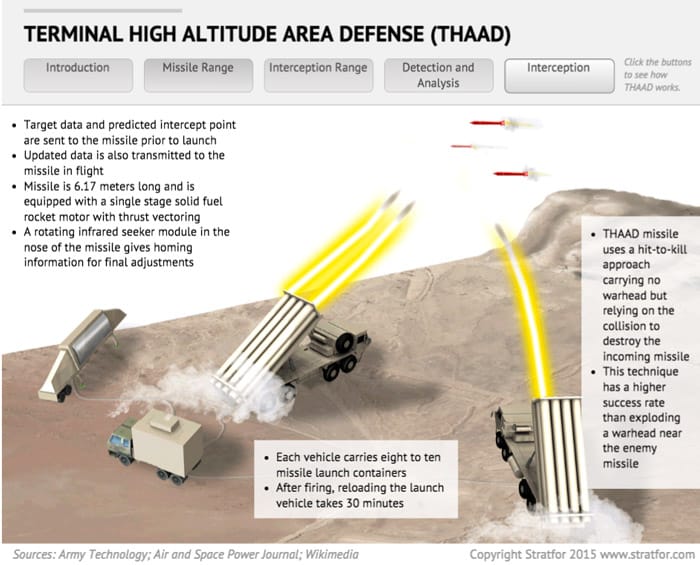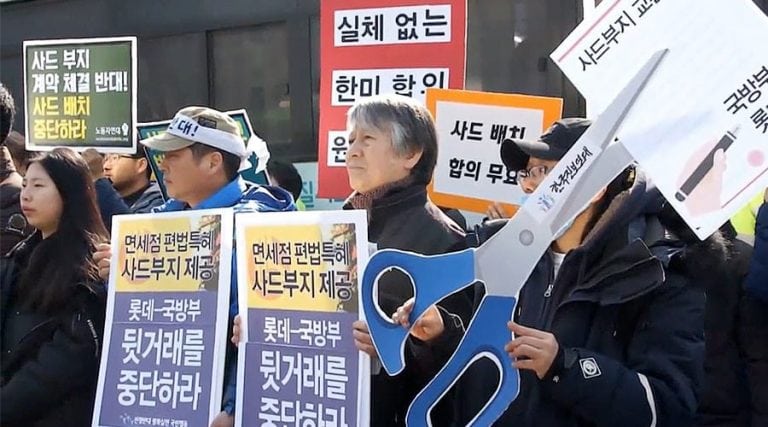 CALEB T. MAUPIN
CALEB T. MAUPIN
Above main image: Photo taken on March 6, 2017 shows a part of Terminal High Altitude Area Defense (THAAD) battery arriving in South Korea. The photo was provided by the U.S. Forces Korea (USFK). [Photo/Xinhua]
- Imagine if over two thousand Chinese troops were stationed in Mexico. Imagine that alongside these troops were F-16 fighter aircraft and A-10 bomber jets. Imagine that in addition, the Mexican army had purchased a huge stockpile of Aegis Destroyers and other military hardware from China. Imagine then, in such a context, China announced it was installing a high-tech missile defense system costing billions of dollars in Mexico, close to the U.S. border.
Under such circumstances there would be massive outcry, not just from the U.S. government, but the population at large. The American people would feel threatened, interpreting the action as an unacceptable provocation.
Those who defend the THAAD system argue that it is simply for defense; but this is not logical; it’s a non-sequitur. The THAAD system, modeled on Israel’s Iron-Dome, may be defensive, but its defensive nature assists in enabling strikes. The system shields U.S. and South Korean military forces, giving them the ability to attack North Korea, Russia, or China, and then deflect any response.
Furthermore, the system has a penetrating radar system allowing American forces to monitor not just the northern part of the Korean Peninsula, but deep into northern China.
It shouldn’t be hard for Americans to understand why China is less than thrilled that this project is underway, with the first components of the system already being unloaded. Furthermore, it shouldn’t be hard for Americans to understand why Chinese businesses might not be anxious to conduct new transactions in Korea at the moment.
The American media presents a situation as if China is being unreasonable in objecting to THAAD, and then somehow “bullying” Korean businesses with “unofficial sanctions.” This simply ignores reality.
Opposition to THAAD certainly exists in Pyongyang, Moscow, and Beijing, but it also exists within South Korea itself. Koreans are anything but unified on the issue. While the formal President certainly supported it, less than 4 percent of the population stands behind her, according to recent polls. Anyway, she was permanently removed from office on Friday and faces a pending impeachment trial for corruption.
Many Koreans have protested against the completion of the THAAD project. The demonstrators, by and large, are not subversives or radicals, but simply patriotic Koreans who believe hostile moves against their Chinese and Russian neighbors do not serve the country’s interest. Among opponents is the well-known politician Lee Jae-myung, who is one of the “big three” likely to run in the upcoming Presidential election.
President Donald Trump was elected in a dramatic upset, not because he promised to continue the status quo, but rather because he promised the opposite. During his campaign Trump said that U.S. military interventions around the world should be reduced, with the guiding principle being “America First.” Trump’s words on the campaign trial specifically talked about the situation on the Korean Peninsula and argued the role of the U.S. military in the region should be reduced.
Popular Democratic Party candidate Bernie Sanders, who was eliminated in the primaries, expressed similar concerns about the extensive military presence in far-off regions. Sanders has often criticized his government’s prioritization of military spending over public health, education, and other pressing domestic concerns.
Chinese leaders clearly do not seek some kind of confrontation with the United States; instead, they have called for greater diplomacy, and greater economic cooperation between the two countries, representing the two largest economies in the world.
East-West tension and ongoing violence in unstable parts of the world, is far more likely to be resolved with good paying jobs, hospitals, schools, housing, space travel, scientific innovation, and high speed rail, than with tanks, drones, warships, or new high-tech missile systems.
The question must be asked, why is this unpopular project being continued in the face of so much widespread opposition, not only from government officials, but from the people themselves? Why is it that forces which frequently invoke “democracy” and “the rule of the people” are carrying out an action that is contrary to the obvious, well-articulated desires of their populations? Furthermore, why are forces that talk about the need to “stabilize” the world, engaging in actions that will undoubtedly exacerbate, not resolve global tensions?
Opinion articles reflect the views of their authors only, not necessarily those of China.org.cn.
 Is an American journalist and political analyst. Tasnim News Agency described him as "a native of Ohio who has campaigned against war and the U.S. financial system." His political activism began while attending Baldwin-Wallace College in Ohio. In 2010, he video recorded a confrontation between Collinwood High School students who walked out to protest teacher layoffs and the police. His video footage resulted in one of the students being acquitted in juvenile court. He was a figure within the Occupy Wall Street protests in New York City. Maupin writes on American foreign policy and other social issues. Maupin is featured as a Distinguished Collaborator with The Greanville Post. READ MORE ABOUT CALEB MAUPIN HERE.
Is an American journalist and political analyst. Tasnim News Agency described him as "a native of Ohio who has campaigned against war and the U.S. financial system." His political activism began while attending Baldwin-Wallace College in Ohio. In 2010, he video recorded a confrontation between Collinwood High School students who walked out to protest teacher layoffs and the police. His video footage resulted in one of the students being acquitted in juvenile court. He was a figure within the Occupy Wall Street protests in New York City. Maupin writes on American foreign policy and other social issues. Maupin is featured as a Distinguished Collaborator with The Greanville Post. READ MORE ABOUT CALEB MAUPIN HERE.
Note to Commenters
Due to severe hacking attacks in the recent past that brought our site down for up to 11 days with considerable loss of circulation, we exercise extreme caution in the comments we publish, as the comment box has been one of the main arteries to inject malicious code. Because of that comments may not appear immediately, but rest assured that if you are a legitimate commenter your opinion will be published within 24 hours. If your comment fails to appear, and you wish to reach us directly, send us a mail at: editor@greanvillepost.com
We apologize for this inconvenience.
Nauseated by the
vile corporate media?
Had enough of their lies, escapism,
omissions and relentless manipulation?
Send a donation to
The Greanville Post–or
But be sure to support YOUR media.
If you don’t, who will?





